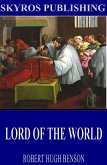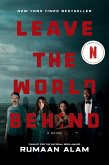Science fiction as a genre of literature was not differentiated in the minds of publishers from fantasy tales until nearly the middle of the Twentieth Century-and that sentence may inflame affectionados of the form but so be it. Is Edward Bellamy's Looking Backwards a political fantasy or science fiction dealing with politics and economics? Good question. The answer is in the mind of the reader.
In the mind of the author of Lord of the World brewed a saga dealing with an uncertain future date when the world is split into warring factions of radical socialists, each in control of one or more continents. Benson calls them communists but he does not have the Leninist-Stalinist-Maoist type communists in mind, just utopian socialists who have abolished most aspect of a capitalist society but retained a semblance of representative-if authoritarian-government. Throughout the world there is universal health care but it advocates euthanasia for those who are depressed, ill or injured. People fly from place to place on transports that double as bombers. A charismatic American politician manages to gain control of all of the continental factions, ending their internecine wars, and uniting them in the task of eliminating religion by bombing the principle headquarters of religious institutions. Survivors are pursued relentlessly. It is a well told tale by a contemporary of Edgar Rice Burroughs, Franz Kafka and Jules Verne.
Robert Hugh Benson's 1907 novel arrived in the same era as L. Frank Baum's Ozma of Oz, G.K. Chesterton's The Man who was Thursday, Kenneth Graham's Wind in the Willows, H. Rider Haggard's Yellow God; An Idol of Africa, and H.G. Well's War in the Air. It is a science fiction period piece but in November of 2013, Pope Francis said that it depicted, "the spirit of the world which leads to apostasy almost as if it were a prophecy." Who knew the Pope read science fiction?
In the mind of the author of Lord of the World brewed a saga dealing with an uncertain future date when the world is split into warring factions of radical socialists, each in control of one or more continents. Benson calls them communists but he does not have the Leninist-Stalinist-Maoist type communists in mind, just utopian socialists who have abolished most aspect of a capitalist society but retained a semblance of representative-if authoritarian-government. Throughout the world there is universal health care but it advocates euthanasia for those who are depressed, ill or injured. People fly from place to place on transports that double as bombers. A charismatic American politician manages to gain control of all of the continental factions, ending their internecine wars, and uniting them in the task of eliminating religion by bombing the principle headquarters of religious institutions. Survivors are pursued relentlessly. It is a well told tale by a contemporary of Edgar Rice Burroughs, Franz Kafka and Jules Verne.
Robert Hugh Benson's 1907 novel arrived in the same era as L. Frank Baum's Ozma of Oz, G.K. Chesterton's The Man who was Thursday, Kenneth Graham's Wind in the Willows, H. Rider Haggard's Yellow God; An Idol of Africa, and H.G. Well's War in the Air. It is a science fiction period piece but in November of 2013, Pope Francis said that it depicted, "the spirit of the world which leads to apostasy almost as if it were a prophecy." Who knew the Pope read science fiction?
Dieser Download kann aus rechtlichen Gründen nur mit Rechnungsadresse in A, D ausgeliefert werden.









